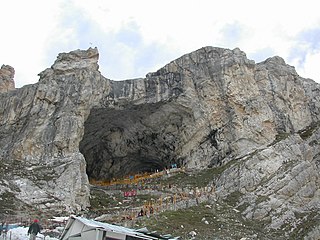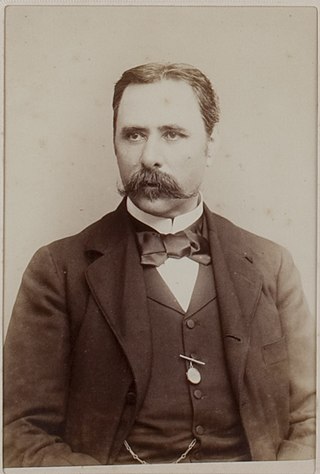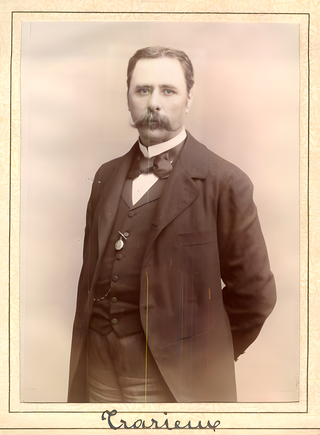Related Research Articles
The Rafto Foundation for Human Rights was established in 1986 in memory of Thorolf Rafto, a professor of economic history at the Norwegian School of Economics (NHH) and a human rights activist. The main objective of the Rafto Foundation is the promotion of freedom of political expression and enterprise. The work of the foundation consists of different educational and informative projects, including the annual award of the Rafto Prize (Raftoprisen) each November. The foundation is based in Bergen, Norway and run by a small team of professionals and volunteers.

The insurgency in Jammu and Kashmir, also known as the Kashmir insurgency, is an ongoing separatist militant insurgency against the Indian administration in Jammu and Kashmir, a territory constituting the southwestern portion of the larger geographical region of Kashmir, which has been the subject of a territorial dispute between India and Pakistan since 1947.

Amarnath Temple is a Hindu shrine located in the Pahalgam tehsil of the Anantnag district of Jammu and Kashmir, India. It is a cave situated at an altitude of 3,888 m (12,756 ft), about 168 km from Anantnag city, the district headquarters, 141 km (88 mi) from Srinagar, the summer capital of Jammu and Kashmir, reached through either Sonamarg or Pahalgam. It is an important shrine in Hinduism.

The Kashmir conflict is a territorial conflict over the Kashmir region, primarily between India and Pakistan, and also between China and India in the northeastern portion of the region. The conflict started after the partition of India in 1947 as both India and Pakistan claimed the entirety of the former princely state of Jammu and Kashmir. It is a dispute over the region that escalated into three wars between India and Pakistan and several other armed skirmishes. India controls approximately 55% of the land area of the region that includes Jammu, the Kashmir Valley, most of Ladakh, the Siachen Glacier, and 70% of its population; Pakistan controls approximately 30% of the land area that includes Azad Kashmir and Gilgit-Baltistan; and China controls the remaining 15% of the land area that includes the Aksai Chin region, the mostly uninhabited Trans-Karakoram Tract, and part of the Demchok sector.

Jacques Ludovic Trarieux was a French Republican statesman, lawyer, prominent Dreyfusard, and pioneer of international human rights.

The Ludovic Trarieux International Human Rights Prize, or Ludovic Trarieux Award, is an international human rights award given annually to a lawyer for contributions to the defence of human rights.
Human rights abuses in Jammu and Kashmir range from mass killings, enforced disappearances, torture, rape and sexual abuse to political repression and suppression of freedom of speech. The Indian Army, Central Reserve Police Force (CRPF), and Border Security Personnel (BSF) have been accused of committing severe human rights abuses against Kashmiri civilians. According to Seema Kazi, militant groups have also been held responsible for similar crimes, but the vast majority of abuses have been perpetrated by the armed forces of the Indian government.
Human rights abuses in Kashmir have been perpetrated by various belligerents in the territories controlled by both India and Pakistan since the two countries' conflict over the region began with their first war in 1947–1948, shortly after the partition of British India. The organized breaches of fundamental human rights in Kashmir are tied to the contested territorial status of the region, over which India and Pakistan have fought multiple wars. More specifically, the issue pertains to abuses committed in Indian-administered Kashmir and in Pakistani-administered Kashmir.
International People's Tribunal on Human Rights and Justice in Kashmir (IPTK) is a People's Tribunal formed by Indian human rights activists for the purpose of probing human right violations in the Indian-administered territory of Jammu and Kashmir, and bridging the gap between people living in Kashmir and rest of India. It was first convened in 2008 by Parvez Imroz, Angana P. Chatterji, Gautam Navlakha and Zaheer-Ud-Din. Chatterji served as convener until December 2012.

Gautam Navlakha is an Indian human rights activist, journalist, and prisoner. He has written on left-wing extremism and is a critic of army and state atrocities in Kashmir. He is a member of People's Union for Democratic Rights, Delhi. He is also an editorial consultant of the Economic and Political Weekly. He resides in New Delhi.
Parveena Ahangar is the Founder and Chairperson of Association of Parents of Disappeared Persons (APDP) in Jammu and Kashmir.

The 2016 Kashmir Riots, also known as the Burhan aftermath, refers to protests in the Indian state of Jammu and Kashmir, chiefly in the Kashmir Valley. It started after the killing of militant leader Burhan Wani by Indian security forces on 8 July 2016. Wani was a commander of the Kashmir-based Islamist militant organisation Hizbul Mujahideen.

Khurram Parvez is a Kashmiri human rights activist. He is the chairperson of Asian Federation Against Involuntary Disappearances (AFAD) and the program coordinator of Jammu Kashmir Coalition of Civil Society. Khurram is a recipient of the 2006 Reebok Human Rights Award. Parvez was included in Time's annual list of the 100 most influential people in 2022.
The Kashmir conflict has been beset by large scale usage of sexual violence by multiple belligerents since its inception.

Media in Jammu and Kashmir comprises a diverse landscape of print, electronic and digital media outlets. The region is served by a variety of newspapers, television channels, radio stations, and online news platforms, reflecting the cultural and linguistic diversity of the area.

The Jammu and Kashmir Reorganisation Act, 2019 is an act of the parliament of India containing provisions to reconstitute the state of Jammu and Kashmir into two union territories (UTs) called Jammu and Kashmir, and Ladakh, and becoming effective on 31 October 2019. A bill for the act was introduced by the Minister of Home Affairs, Amit Shah, in the Rajya Sabha on 5 August 2019 and was passed on the same day. It was then passed by the Lok Sabha on 6 August 2019 and it received the president's assent on 9 August 2019.
Mass graves of Jammu and Kashmir are mass grave sites in Jammu and Kashmir that were created as a result of extra-judicial killings during the Insurgency in Kashmir. An ad-hoc inquiry led by human rights lawyer, Parvez Imroz, has found more than 6,000 unmarked and mass graves.
Irfan Mehraj is a journalist and human rights activist from Kashmir. He works with Deutsche Welle and also writes for various publications like The Indian Express, TRT World, The Wire, The Caravan, Himal Southasian and NewArab. Irfan has specially written about the challenges facing the Muslim community in Kashmir. He was the Editor of Two Circles and the founding editor of Wande Magazine.
AasiaJeelani (1974–2004) was a Kashmiri journalist and human rights activist. After completing her studies in Srinagar, Kashmir, she worked for Agence France Presse (AFP) and then the Times of India. She set up the Association of Parents of Disappeared Persons (APDP) and the Kashmiri Women's Initiative for Peace and Disarmament (KWIPD), editing the latter's newsletter. On 20 April 2004, Jeelani and other activists were monitoring elections when the car she was travelling in was blown up by an improvised explosive device and she was killed. She is remembered as a pioneering feminist journalist.
References
- ↑ "Q&A: 'Element of fear is gone' for Kashmir's youth". www.aljazeera.com. Retrieved 22 April 2017.
- 1 2 Fahad Shah. "Exposed: India's Silence Over Human Rights Violations in Kashmir". The Diplomat. Retrieved 22 April 2017.
- ↑ "Conveners, Legal Counsel, and Liaison". kashmirprocess.org. Retrieved 22 April 2017.
- ↑ Scott-Clark, Cathy (9 July 2012). "The mass graves of Kashmir". The Guardian. ISSN 0261-3077 . Retrieved 22 April 2017.
- ↑ "Parvez IMROZ - Ludovic-Trarieux International Human Rights Prize 2006". ludovictrarieux.org. Retrieved 22 April 2017.
- ↑ "Parveena Ahangar, Parvez Imroz Awarded Norway's Rafto Prize for Human Rights". The Wire. Retrieved 15 June 2018.
- ↑ "Parveena Ahangar & Parvez Imroz". The Rafto Foundation. Archived from the original on 15 June 2018. Retrieved 15 June 2018.
- ↑ "Parveena Ahangar, Parvez Imroz Awarded Norway's Rafto Prize for Human Rights". The Wire. Retrieved 16 June 2018.
- ↑ "Who we are – Jammu Kashmir Coalition of Civil Society (JKCCS)". jkccs.net. Retrieved 16 June 2018.
- 1 2 "NATASHA RATHER - HRD, WRITER Jammu Kashmir Coalition of Civil Society (JKCCS)". Front Line Defenders. 11 August 2017.
- ↑ "'Tip of the iceberg'". www.frontline.in. Retrieved 16 June 2018.
- ↑ "Terrorized: Impact of Violence on the Children of Jammu and Kashmir". jkccs.net. Retrieved 16 June 2018.
- ↑ "J&K: 318 children killed since 2003, most shot dead, reveals report". The Indian Express. 31 March 2018. Retrieved 16 June 2018.
- ↑ "J&K activist gets Reebok Human Rights Award". Rediff. Retrieved 16 June 2018.
- ↑ "South Korean Human Rights Award to Rafto Laureate 2017 Parvez Imroz". The Rafto Foundation. Archived from the original on 15 March 2021. Retrieved 15 March 2021.